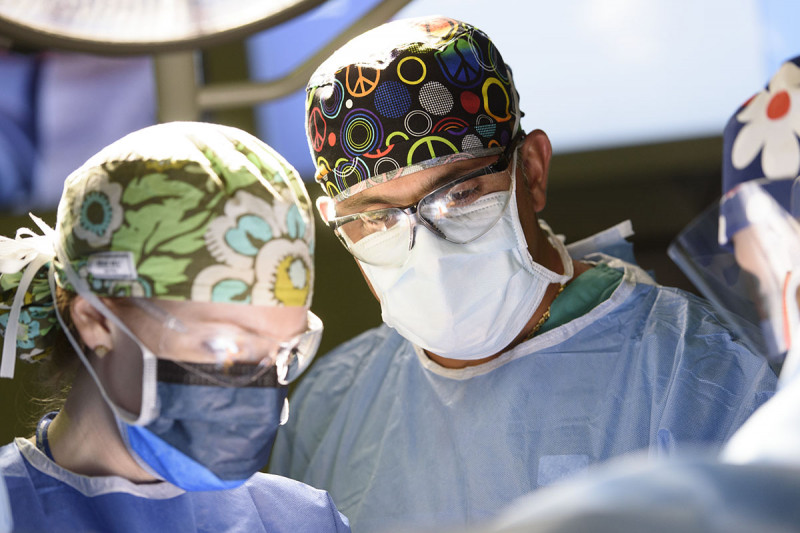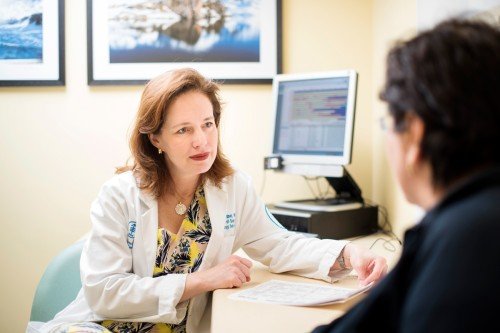
MSK gynecologic surgeon Mario Leitao specializes in treating vulvar and vaginal cancers.
In its annual listing of the country’s best hospitals, U.S. News & World Report ranked Memorial Sloan Kettering number one in gynecology for 2019. MSK’s oncologists, surgeons, nurses, and pathologists are the leaders in diagnosing and treating well-known gynecologic cancers, such as cervical cancer, endometrial cancer, and ovarian cancer.
They also have vast experience in treating uncommon gynecologic cancers. This includes types that some healthcare providers may see only once or twice in their whole careers.
Here are some of the less common gynecologic cancers that MSK’s experts are successfully treating.
Vulvar and Vaginal Cancers
Vulvar cancer affects about 6,000 women per year, and vaginal and related cancers affect another 5,000. About 60% of these cancers are associated with human papillomavirus infections; these cases tend to develop in younger women. The other 40% are often caused by a skin condition called lichen sclerosus, which usually occurs after menopause.
MSK gynecologic surgeon Mario Leitao specializes in treating vulvar and vaginal cancers. These are usually squamous cell cancers similar to those that grow on other parts of the skin. Most women with these cancers have surgery as part of their treatment.
Dr. Leitao and his colleagues have conducted clinical trials on the use of sentinel node biopsies in these surgeries, including the use of new types of imaging agents to guide the procedure. Sentinel node biopsies involve removing only one or two lymph nodes in the groin area to test if the cancer has spread. This allows women to avoid side effects, like lymphedema of the legs, a debilitating and painful swelling that can occur when all the lymph nodes in that area are removed.
For those whose cancer comes back after treatment, MSK has additional options. “Our goal is to cure women when they first present with cancer,” Dr. Leitao says. “But when things don’t go the way we want, we’re a leading center for the larger, more complex surgeries that may be required.”
A rare subset of vaginal and vulvar cancers — about 1% — is melanoma. Dr. Leitao, medical oncologist Alexander Shoushtari, and radiation oncologist Marisa Kollmeier run a clinic for women with vulvar and vaginal melanoma. Patients are often able to see all three specialists on the same day.
As with other types of melanoma, immunotherapy with checkpoint inhibitor drugs is often used to treat gynecologic melanoma. The drugs may be given in combination with radiation therapy to improve their effectiveness.
“Each of these patients is unique, and we come up with a specialized treatment plan for each of them,” Dr. Leitao explains. “They all get their tumors tested with MSK-IMPACTTM, which can teach us a lot about the mutations driving these cancers. We are learning much more about the genetic and molecular makeup of gynecologic melanomas, with the goal of developing even better treatments in the future.”
Uterine Sarcoma
Most cancer of the uterus is endometrial cancer. This starts in the tissue that lines the uterus. Uterine sarcoma, which develops in the muscle or connective tissue, is much less common. There are several types of uterine sarcoma, including leiomyosarcoma, high-grade undifferentiated sarcoma, and endometrial stromal sarcoma. Uterine sarcoma is rare, making up less than 4% of all cancers of the uterus. Only 1,200 women are diagnosed with this disease in the United States each year.
Most uterine sarcoma is treated with surgery. Gynecologic oncologist Oliver Zivanovic specializes in these procedures. “The experience of the surgeon is very important,” he notes. “When these tumors are removed, achieving negative margins is very important. Some uterine sarcomas are quite large or infiltrate into the surrounding tissue, so it’s not always an easy surgery.”
For women who need chemotherapy after surgery, Dr. Zivanovic often collaborates with MSK medical oncologist Martee Hensley, an internationally recognized leader in treating these cancers.
One of the challenges of treating uterine sarcoma is that it often doesn’t have symptoms, or its symptoms are similar to much more common noncancerous conditions, like fibroids. Additionally, because it’s so rare, uterine sarcoma has no established screening methods. But experts at MSK have reported there is one group of women who are at a higher risk of leiomyosarcoma: those who have previously been treated for retinoblastoma, a type of eye cancer in children that is often hereditary.
For these women, Dr. Zivanovic and MSK ophthalmic oncologist Jasmine Francis have established a surveillance program, which offers annual exams with imaging including MRI and ultrasound. In addition to helping women at the highest risk of developing a second cancer, the investigators say that what they learn from these women will enable them to develop better detection strategies for all cases of uterine sarcoma.
Uncommon Ovarian Cancers
All ovarian cancers are considered rare, but some types are even less common. One of these, called small cell carcinoma of the ovary, hypercalcemic type (SCCOHT), has had only about 500 documented cases to date. Despite its low incidence, MSK researchers have conducted extensive research on SCCOHT.
In 2014, MSK gynecologic surgeon Jennifer Mueller was part of a team that found a particular mutation in a gene called SMARCA4 present in this aggressive cancer. Although the discovery has not yet yielded any targeted therapies, further studies revealed that nearly half of these mutations are inherited. This discovery has important implications for family members of women diagnosed with these tumors.
Dr. Mueller recently performed risk-reducing surgery on a young woman who learned she had the SMARCA4 mutation after her sister was diagnosed with SCCOHT. The woman had her eggs retrieved and banked before the removal of her ovaries. “If it hadn’t been for the research done at MSK, as well as the genetic counseling offered to the family, this young woman would have never known she carried this risk,” Dr. Mueller says.
Dr. Mueller treats other less-common forms of ovarian cancer, including clear cell, endometrioid, and germ cell tumors. “For any woman who has one of these rare types, I would encourage her to get a second opinion with a pathologist who has experience in diagnosing them,” she says. “Getting a proper diagnosis can have a major impact on treatment decisions, which can, in turn, affect outcomes as well as a woman’s quality of life.”
Gestational Trophoblastic Disease
Gestational trophoblastic disease (GTD) is a tumor that develops from fetal tissue after a pregnancy, including a full-term delivery, a miscarriage, or an ectopic pregnancy. If the tumor is cancerous, it is called a gestational trophoblastic neoplasm (GTN).
These tumors are treated with surgery. More advanced cases may require chemotherapy. MSK medical oncologist Carol Aghajanian is a nationally recognized leader in treating GTN when chemotherapy is needed.
“The good news is that GTNs are almost 100% curable,” Dr. Mueller says. “But because they are uncommon, it’s important to make sure that you have the correct diagnosis. If a woman is diagnosed with a cancerous form and it turns out not to be cancer, she may be given additional treatments that she doesn’t need.”
Supportive Services
For women with gynecologic cancers of all types, MSK’s Female Sexual Medicine and Women’s Health Program, run by psychologist Jeanne Carter, offers comprehensive, personalized care.
MSK also has physical therapists who specialize in pelvic physical therapy. This process can be helpful in dealing with pelvic pain and pressure, which is especially common after radiation treatments.









